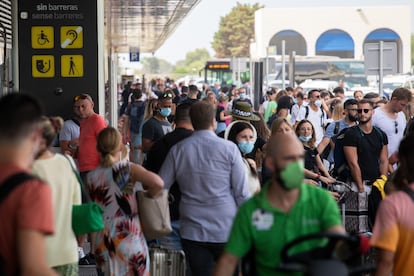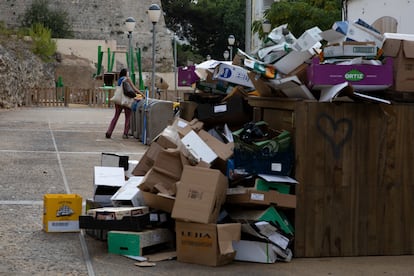‘In Ibiza it’s practically impossible to be independent’
Residents of the Balearic Island have to contend with high rental and property prices, while there are also problems with municipal services such as garbage collection and water treatment


Noemí Martinez arrived in Ibiza from Burgos four years ago with a job already arranged. She lived with a single-room apartment that was shared with two other people, then in a room for which she paid €700 plus bills. “I earned €1,400 and took out €900 at the start of every month,” she explains. “I never had enough money.”
She says that she has lived in “matchboxes” as well as apartments where the owner would sublet at abusive prices. In October, she found a house in the countryside, where she went to live with a colleague at a cost of €500 a month. “It’s impossible to live alone,” she explains. “People as old as 50 are sharing apartments here, the prices never go down and you run out of patience. In the end, you have to leave.”
The price of a place to live in the municipality reached €4,887 per square meter in July of this year
The municipality of Ibiza, popularly known as Vila to distinguish it from the island, is the the most densely populated area of the Balearic Islands, with 51,128 inhabitants spread across little more than 11 square kilometers. The population density is around 4,600 people per square kilometer. The more people there are in an area that is constricted by the surrounding sea, the lower the supply of residential housing. Many take advantage of these conditions in order to raise prices to unaffordable levels.
The price of a place to live in the municipality reached €4,887 per square meter in July of this year, according to a price report from the Idealista real estate website. “Few Ibizans consider buying an apartment at these prices,” explains the mayor, Rafael Ruiz. “Building public housing is not the only solution. We need to combat the illegal tourist rentals, which are affecting the balance of coexistence.”
Residents are faced with a price of €17.80 per square meter in rental accommodation, according to Idealista: a 50-square-meter studio costs €890 a month. M. P., a special education teacher who prefers not to disclose her full name, given she has just found a place to live, explains that the road was long before she could find a 90-square-meter apartment, which is costing her and her partner €1,000 a month. She found the property via an agency that only works with local landlords who want to rent to other locals. While this arrangement has benefitted M. P., she says that she thinks it is “unfair for those from outside.”
Before now, she had lived in rooms where she paid €400 in winter and €500 in summer, and while searching for a new place to live she came across demands for €800 a month for less than 50 square meters, insurance against non-payment, payslips, long-term contracts or large deposits. “If your parents don’t have a house and there’s no one who can do you a favor, it’s practically impossible to be independent,” she complains. “Rents are staying high and buying somewhere isn’t an option.” Her friends from university, she adds, have been able to get there own places on mainland Spain at much more reasonable prices.

In a municipality where the population rises by more than 200% during the tourism season, there are other problems to contend with. The water supply, for example. “The current treatment plant doesn’t clean the water,” the mayor explains. “It’s one of the oldest in the country.” There are also issues with garbage collection, the healthcare system is under pressure and there are mobility problems, given the huge fleet of rental cars on the island.
Mass tourism
Iván Murray, a doctor in geography and environmental sustainability at the Balearic Islands University (UIB), sums up the situation: “The Balearic Islands are a demographic powerhouse given its situation as a mass tourism destination. Ibiza is the best example of this, and the other islands are heading in this direction, which is something that must be avoided. The situation is dramatic in terms of inequality, population displacement and the price of housing.”
“The city has seen its population grow 53% in the last 20 years,” adds Mayor Vila. “We need a fairer distribution [of resources], we need to receive a balance compared to what we generate, and there isn’t a brand in the world that generates as much as Ibiza.”
English version by Simon Hunter.
Tu suscripción se está usando en otro dispositivo
¿Quieres añadir otro usuario a tu suscripción?
Si continúas leyendo en este dispositivo, no se podrá leer en el otro.
FlechaTu suscripción se está usando en otro dispositivo y solo puedes acceder a EL PAÍS desde un dispositivo a la vez.
Si quieres compartir tu cuenta, cambia tu suscripción a la modalidad Premium, así podrás añadir otro usuario. Cada uno accederá con su propia cuenta de email, lo que os permitirá personalizar vuestra experiencia en EL PAÍS.
¿Tienes una suscripción de empresa? Accede aquí para contratar más cuentas.
En el caso de no saber quién está usando tu cuenta, te recomendamos cambiar tu contraseña aquí.
Si decides continuar compartiendo tu cuenta, este mensaje se mostrará en tu dispositivo y en el de la otra persona que está usando tu cuenta de forma indefinida, afectando a tu experiencia de lectura. Puedes consultar aquí los términos y condiciones de la suscripción digital.








































